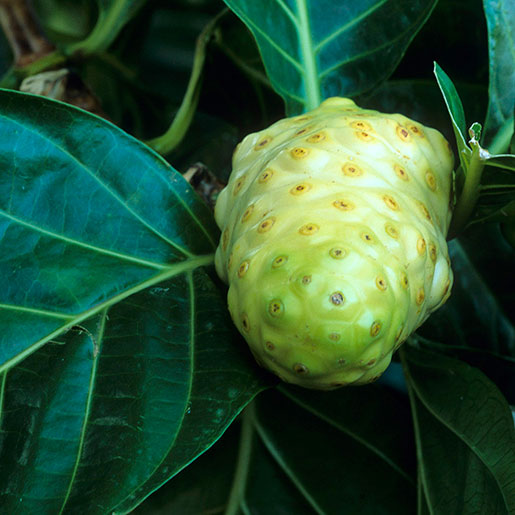Noni

Common Names: noni, morinda, Indian mulberry, hog apple, canarywood
Latin Names: Morinda citrifolia
Background
- Noni is a small evergreen tree found in the Pacific Islands, Southeast Asia, Australia, and India.
- Traditionally, noni has been used to treat the common cold, bacterial infections, fevers, and gastrointestinal problems. The plant’s roots, stem, bark, leaves, flowers, and fruit have all been used medicinally.
- Today, noni is promoted as a dietary supplement for immune system health, digestive health, strength and energy, aging skin, and other conditions.
How Much Do We Know?
- Only a very small number of studies have investigated the effects of noni in people.
What Have We Learned?
- In laboratory research, noni has shown antioxidant, immune-modulating, antimicrobial, antifungal, and tumor-fighting properties. These results suggest that noni may warrant further study for various diseases. However, noni has not been shown to have beneficial effects on any health condition in studies of people.
What Do We Know About Safety?
- Noni juice might be safe when used for up to 3 months. However, several cases of liver toxicity have been reported in people who had consumed noni juice or noni tea for several weeks. It is unclear whether noni caused the liver problems.
- There isn’t enough reliable information to know whether noni fruit extract is safe.
- There isn’t enough reliable information to know whether it’s safe to use noni topically (applied to the skin).
- Noni contains a substantial amount of potassium. People who have kidney disease or need to restrict their intake of potassium should consult a health care provider before using noni.
- It may be unsafe to take noni along with certain medicines, including medicines that increase potassium, decrease blood pressure, or harm the liver. If you take any type of medicine, talk with your health care provider before using noni or other herbal products; some herbs and medicines interact in harmful ways.
- Little is known about whether it’s safe to use noni during pregnancy or while breastfeeding.
Keep in Mind
- Take charge of your health—talk with your health care providers about any complementary health approaches you use. Together, you can make shared, well-informed decisions.
- Federal Regulation of Herbal Products
- Depending on what’s in them, how they’re intended to be used, and how they’re administered (orally or topically), herbal products are regulated in a variety of ways. Many herbal products intended for oral use are marketed as dietary supplements. The rules for making and distributing dietary supplements are less strict than those for drugs.
- Unlike drugs, dietary supplements are not approved by the U.S. Food and Drug Administration (FDA) before they are sold to the public. When public health concerns arise about the safety of a dietary supplement or an ingredient including an herb, the FDA can take action to protect the public. Manufacturers and distributors of supplements are responsible for evaluating the safety and labeling of their products before marketing to ensure that they meet all regulatory requirements.
NCCIH Clearinghouse
The NCCIH Clearinghouse provides information on NCCIH and complementary and integrative health approaches, including publications and searches of Federal databases of scientific and medical literature. The Clearinghouse does not provide medical advice, treatment recommendations, or referrals to practitioners.
Toll-free in the U.S.: 1-888-644-6226
Telecommunications relay service (TRS): 7-1-1
Website: https://www.nccih.nih.gov
Email: info@nccih.nih.gov (link sends email)
PubMed®
A service of the National Library of Medicine, PubMed® contains publication information and (in most cases) brief summaries of articles from scientific and medical journals. For guidance from NCCIH on using PubMed, see How To Find Information About Complementary Health Practices on PubMed.
Website: https://pubmed.ncbi.nlm.nih.gov/
Office of Dietary Supplements (ODS), National Institutes of Health (NIH)
ODS seeks to strengthen knowledge and understanding of dietary supplements by evaluating scientific information, supporting research, sharing research results, and educating the public. Its resources include publications (such as Dietary Supplements: What You Need To Know) and fact sheets on a variety of specific supplement ingredients and products (such as vitamin D and multivitamin/mineral supplements).
Website: https://ods.od.nih.gov
Email: ods@nih.gov (link sends email)
Key References
- Agarwal G, Carcache PJB, Addo EM, et al. Current status and contemporary approaches to the discovery of antitumor agents from higher plants. Biotechnology Advances. 2020;38:107337.
- Chanthira Kumar H, Lim XY, Mohkiar FH, et al. Efficacy and safety of Morinda citrifolia L. (noni) as a potential anticancer agent. Integrative Cancer Therapies. 2022;21:15347354221132848.
- Kitic D, Miladinovic B, Randjelovic M, et al. Anticancer and chemopreventive potential of Morinda citrifolia L. bioactive compounds: a comprehensive update. Phytotherapy Research. 2024;38(4):1932-1950.
- Noni. NatMed Pro website. Accessed at naturalmedicines.therapeuticresearch.com on July 15, 2024. [Database subscription].
This publication is not copyrighted and is in the public domain. Duplication is encouraged.
NCCIH has provided this material for your information. It is not intended to substitute for the medical expertise and advice of your health care provider(s). We encourage you to discuss any decisions about treatment or care with your health care provider. The mention of any product, service, or therapy is not an endorsement by NCCIH.